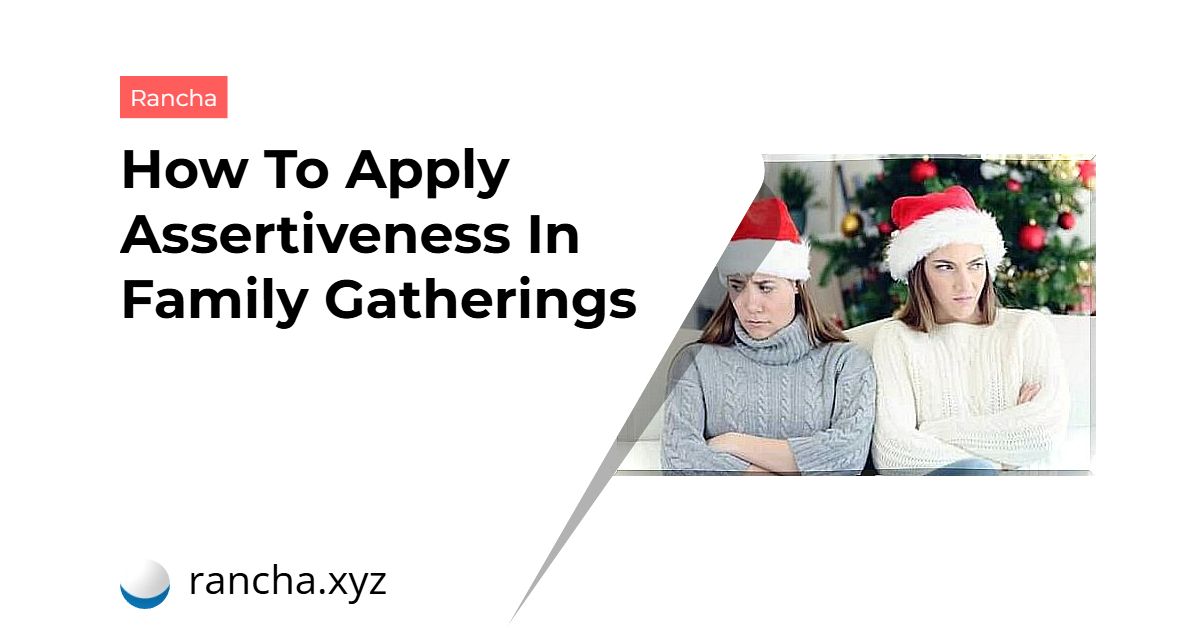Applying assertiveness to family gatherings is the key to survival. The reason? Often, at Christmas dinners, gatherings to celebrate birthdays or other events, a whole series of dynamics converge that can make us lose our calm and even our patience.
After all, a family is a complex tribe with different opinions, in which harmony does not always reign among its members.
As the saying goes, in a home everyone has the right to think differently, because what matters is knowing how to respect and live together. However, this is not always the case.
This fact gets a little more complicated during the holidays, when there is a rest from professional responsibilities, but when, suddenly, it is necessary to prepare for a reunion with part of the family that we haven’t seen for a while.
We travel long (or short) distances to attend dinner, lunch, or a long-time appointment on the calendar. So sometimes we do it with some anxiety. Let’s meet again that cousin who likes to tease us about our ideologies. We’re going to find that uncle who always judges us or that aunt who asks us when we’re going to get a better job, when we’re going to get married or have kids.
Exchanging our comfort zone for enemy territory is not always easy. However, and despite such meetings not always being like in the movies (a moment when harmony, glamor and magic reign), we managed to survive. What’s more, we can get away with it and, on top of that, feel extremely proud of ourselves.
These are some tips to achieve this goal.

Strategies for applying assertiveness in family gatherings
These counsels for applying assertiveness in family home evenings should be trained. It is not enough just to read and understand. It is necessary to add other essential ingredients: the courage, the will to change and the confidence in oneself to put them into practice.
We don’t just say this on a whim. When the person we are dealing with is a family member, we usually have a hard time addressing them assertively because the emotional component holds us back.
We are afraid of offending in some way, and that leads us to opt for silence and that “it’s better not to say anything” thought. This is not appropriate, because what is allowed to pass weighs on self-esteem and leaves marks.
So let’s see what dimensions we should take into account.
Be present, connected with your emotions and be direct
The primary goal in any family gathering should be to feel good, spend quality time, and enjoy in harmony. It is possible that around you there are variables (people) that spoil this goal a little. However, you only need to keep one idea in mind: whatever happens, I’ll be fine and I won’t lose my temper with anything or anyone.
That goal includes being present. That way, it’s not worth keeping your mind elsewhere or fiddling with your cell phone while you want everything to be over soon. Focusing on the here and now will help you establish a better connection with your emotions. Thus, in the face of any event that dares to end the calm, it is best to be direct. But in what way?
- Don’t be afraid to speak in the first person, making it clear what you want and what you don’t want. “Now I don’t want to talk about this subject. We are celebrating and this is not the time.”
- If you see someone intending to start a discussion, assertively neutralize them “I think you want to talk about issues that distance us. We are not here to discuss, but to have fun”.
- At the same time, if you notice that a situation is being built up that could trigger disagreements or problems, try to resolve it as soon as possible for the good of all. Remind everyone what the purpose of this family gathering is: to have fun.

You have no obligation to respond to what you don’t want
When it comes to applying assertiveness in family gatherings, remember a very simple principle: You are under no obligation to answer questions that bother you or are private. No relative, however close, has authority over you.
So if you don’t want to talk about something, just don’t talk. You can make this clear assertively, respectfully and safely.
The professional debaters at the family table
There are family members with PhDs in the art of discussion, of unhealthy reply, of “I argue for arguing, to contradict you”. In these situations, we usually have two options: ignore or enter the communicative arena.
In this context, we must consider the following:
- Often, those who love to argue, disagree and disagree without reason seek to attack in order to position themselves in relation to their opinion or ideology and, thus, belittle the other. In these cases, there is only one option left: “I understand and respect your posture, but I’m not here to waste my time, but to have fun. You have your beliefs and I have mine. Let’s try to make things more productive than arguing.”
- Generally, professional debaters prefer to attack than to make solid (and even logical) arguments. In such situations, a good strategy is to question them, ask several questions, the more the better. Using calm, good humor and decision, sooner or later they will end up contradicting themselves.
Your own well-being first
It takes concentration to successfully survive a family reunion that, by itself, causes us discomfort or anxiety. We need to put in our minds the idea that we are going to be okay, and in order to do that, we must know what our limits are. Therefore, the ideal is to work with the following proposals:
- Before attending the meeting, be clear in your mind which situations you do not want to tolerate.
- Visualize these boundaries and establish your safety territory. Knowing what things and circumstances you will not accept should provide an appropriate sense of calm and comfort.

In conclusion, if we dare to apply assertiveness in family gatherings, we will see a big difference. Not only will we get away with any arguments or disagreements, but we’ll also gain experience and be able to apply these same tips in any other context.
 rancha.xyz Be free to choose their own route to self-knowledge, health and balance of body and soul.
rancha.xyz Be free to choose their own route to self-knowledge, health and balance of body and soul.




